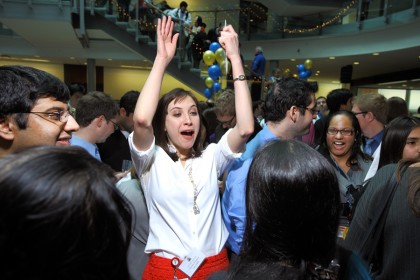After years of studying, deciding what type of doctor they want to be and applying to numerous residency programs, graduating Johns Hopkins medical students—and thousands of others across the nation—found out Friday where they will launch their careers as doctors.

Image credit: Keith Weller / JHMI
Of the 113 JHU graduates, 42 will be doing their residencies at The Johns Hopkins Hospital, Bayview Medical Center, or another Johns Hopkins-affiliated program at another Baltimore hospital.
A Match Day celebration took place at the Johns Hopkins University School of Medicine on the second floor of the Armstrong Medical Education Building. The students, along with family members, friends, and mentors, gathered for brunch at 10:45 a.m., and at noon, students opened envelopes telling them which hospitals and specialty programs have accepted them for their residency.
"Some of the most popular specialty areas among this year's graduates are general internal medicine, pediatrics, emergency medicine, ophthalmology, and general surgery," said Thomas Koenig, M.D, associate dean for student affairs at the School of Medicine. "After training in those and other disciplines, many go on to fellowships in specialized areas of medicine, such as cardiology and pulmonology—or they may pursue training in surgical subspecialties, such as vascular or thoracic surgery."
Thirty-five students applied to general internal medicine residencies, 12 in pediatrics, 10 in emergency medicine, and five in general surgery. The rest were spread out in a variety of specialty areas, including radiology, neurosurgery, orthopedics, and Ob/Gyn. The graduating class includes 57 men and 56 women.
Match Day takes place on the same day every year at medical schools around the country. The National Resident Matching Program (NRMP) pairs the wishes of the students with the needs of hospitals' residency programs. For couples who wish to match in the same city, there's a special process that links their applications.
Prior to Match Day, students complete lengthy paperwork and on-site interviews with hospitals and then provide a ranked list of top choices. Hospitals submit a similar list indicating openings, preferred students, and specialty or generalist preferences. Each applicant is matched via computer algorithm to the hospital residency program that is highest on the applicant's list and that has offered the applicant a position. Johns Hopkins students often match to their first- or second-choice sites.
Read more from Hopkins MedicinePosted in Health, University News, Student Life







